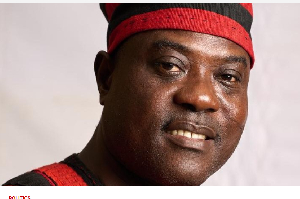 George Twum-Barima-Adu/Nyaaba-Aweeba Azongo ticket for the 2024 general elections
George Twum-Barima-Adu/Nyaaba-Aweeba Azongo ticket for the 2024 general elections
An Independent Presidential candidate in the 2024 elections has proposed a new national development model that seeks to actively integrate the chieftaincy institution into the country’s governance and development process.
The ‘Bipolar Institutional Governance (BIG) Ghana Model’, which is one of the national governance and development strategies of the George Twum-Barima-Adu/Nyaaba-Aweeba Azongo ticket for the 2024 general elections, is a triple helix policy – capital-land-factor driven partnership.
The model proposes the government as the policy enabler, which sets the policy and regulations; the private sector (which is the engine of growth) provides the capital, and the traditional authority (who are the owners of the land, leaders of the people and the mobilizers of the people for development), becomes the vehicle for development and sustainable environmental management.
Nyaaba-Aweeba Azongo, the Vice Presidential Candidate to George Twum-Barima-Adu, explaining the new model to the Ghana News Agency, pointed out that the major fault in Ghana’s unipolar development governance (public sector) framework, which was posing a challenge to broad-based development and the preservation of the environment, was the deliberate exclusion of the traditional authority sector in the current “romantic” national development framework, known as the Private-Public Partnership (PPP).
He said the PPP model was a foreign import and did not fit into the Ghanaian development context as a strategic development partnership model.
“The private sector has no institutional context, remains amorphous, blurred and subject to manipulation by the political class for parochial interest.
“The private sector is profit-making and cannot be held accountable for development, neither can it be mandated to lead growth and development.
“It plays an important role in employment creation and revenue generation, but its development mandatory role is being overstretched as an escape route for institutional leadership failure,” he stated.
Azongo, a Development Consultant with many years of scholarship and practice, said Ghana’s development crisis was a leadership crisis, and that could not be over-emphasized, adding that the fundamental thrust of Ghana’s leadership crisis lay in the lack of space and the exclusion of the chieftaincy institution as an integrated partner to mobilize the critical mass of the people outside the political spectrum to foster national cohesion for an all-inclusive development order.
He said the chieftaincy institution could no longer be subjugated and treated as a “mere wheel of political governance, but a mutually integrated partner to offer development leadership and accountability.
“The chieftaincy institution currently boasts of the cream of Ghana’s intelligentsia, professional class and has unfettered access to all classes of Ghanaian expertise across the world as subjects to utilize its institutional mobilization potential as a key leadership partner for national development,” he added.
Azongo stated that “the stakes are too high for chiefs to continue to serve as development spectators, ornaments to spice political project commissioning and receptionists for political campaigning.
This cannot be the role of chieftaincy in the contemporary development exigencies in the face of scathing poverty, existential environmental threat, rural atrophied economies and explosive youthful population struggling to find meaning and purpose in their motherland”.
He said the George Twum-Barima-Adu/Nyaaba-Aweeba Azongo ticket for 2024 had proposed two key policy initiatives for the traditional sector under the Domestic Direct Investment overarching policy framework and environment.
One is the Traditional Area Investment Fund (TRAIN Fund), which was an initial Traditional Area Investment-Social Economic Endowment Development (TRAIN-SEED) fund that had projected a minimum of GHc two billion for the first year of implementation.
The fund shall invest across the world to yield returns for massive domestic direct investments in the agriculture and tourism sectors since the traditional sector controls the land from production to storage and processing.
This is to make Ghana the food basket of West Africa and the tourists’ hub of Africa.
The second one is the traditional sector partnership in the management of forest resources: the triple helix partnership approach.
Azongo pointed out that the triple helix partnership as the new order shall include traditional sector partnership in the agreement, management, and benefit sharing of land resources as well as the preservation of the environment within the framework of the communities/traditional area values, customary laws and heritage systems.
The policy goal, he pointed out, was to integrate the traditional sector into the public-private partnership framework to utilize the chieftaincy’s time-tested indigenous structures of governance, internalized community support and protective systems to build self-secured local economies in a sustainable manner.